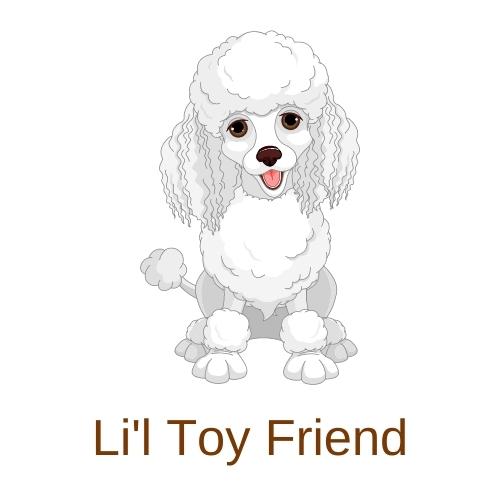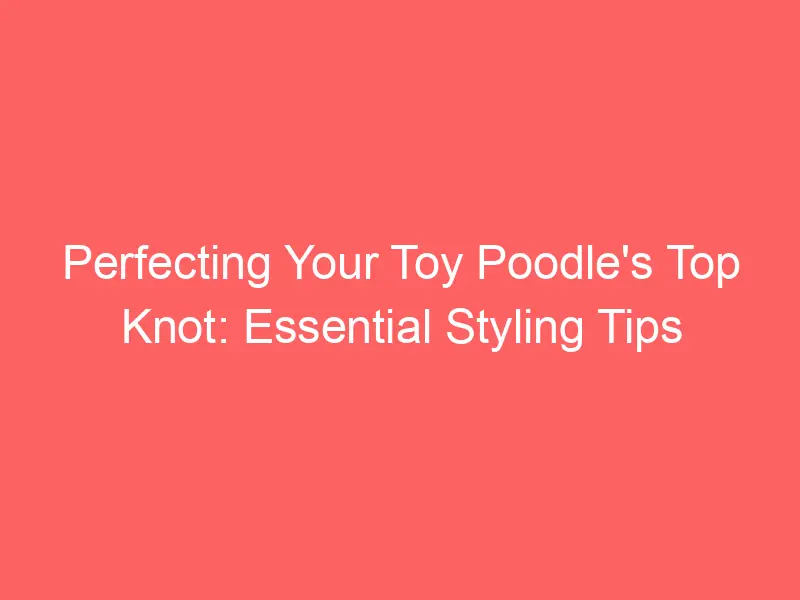Introduction to Toy Poodle Behavior

Toy Poodles are a small breed of dog known for their intelligence, energy, and affectionate nature. They are often misunderstood due to their size and appearance, but understanding their behavior can help you build a stronger bond with your pet.
-
- Understanding the unique traits of Toy Poodles
Toy Poodles are known for their intelligence and agility. They are quick learners and can be trained to perform various tricks. They are also known for their loyalty and can form strong bonds with their owners. Despite their small size, they have a lot of energy and require regular exercise to stay healthy and happy. They are also known for their playful nature and love to engage in games and activities with their owners. Learn more about Toy Poodles here.
-
- Common misconceptions about Toy Poodle behavior
Many people believe that Toy Poodles are high-strung or overly aggressive. However, this is not the case. While they can be energetic and playful, they are not inherently aggressive dogs. They are also often perceived as being difficult to train due to their intelligence, but this is also a misconception. With consistent training and positive reinforcement, Toy Poodles can be very obedient and well-behaved pets. Another common misconception is that they are not good with children or other pets. However, with proper socialization, they can get along well with both.
In conclusion, understanding the behavior of Toy Poodles can help you build a stronger bond with your pet. They are intelligent, energetic, and affectionate dogs that can make wonderful companions if trained and socialized properly.
Understanding Toy Poodle Barking Habits
One of the most distinctive traits of Toy Poodles is their barking habits. Understanding why they bark can help you better communicate with your pet and ensure their needs are met.
Why Do Toy Poodles Bark?
There are several reasons why Toy Poodles bark. Let’s take a closer look at the main ones:
- Communication: Toy Poodles, like all dogs, use barking as a form of communication. They may bark to alert you to something unusual or to express their needs. For example, your Toy Poodle might bark when they’re hungry, need to go outside, or want to play.
- Boredom or loneliness: Toy Poodles are intelligent and active dogs. If they don’t get enough mental and physical stimulation, they can become bored or lonely and may bark to express their frustration. Regular playtime and walks can help keep your Toy Poodle entertained and reduce unnecessary barking.
- Response to stimuli: Certain stimuli, such as loud noises, unfamiliar people, or other animals, can trigger barking in Toy Poodles. It’s their way of responding to the environment around them. Understanding what triggers your Toy Poodle’s barking can help you manage it effectively.
Understanding your Toy Poodle’s barking habits is the first step towards creating a peaceful and happy environment for both you and your pet. Remember, barking is a natural behavior for dogs, and it’s an important way for them to communicate with you. By paying attention to when and why your Toy Poodle barks, you can better meet their needs and strengthen your bond.
Factors Influencing Toy Poodle Barking Habits
Just like humans, dogs also have their unique personalities and behaviors. Toy Poodles, known for their intelligence and vibrant energy, are no exception. There are several factors that influence their barking habits. Let’s delve into these factors:
-
- Environment
The environment in which a Toy Poodle is raised and lives plays a significant role in their barking habits. For instance, dogs living in noisy or chaotic environments may tend to bark more as a response to the stimuli around them. On the other hand, those in calm and quiet environments may bark less. It’s important to provide a peaceful and secure environment for your Toy Poodle to help manage their barking habits.
-
- Training
Training is another crucial factor that influences a Toy Poodle’s barking habits. Dogs that are trained from a young age to understand when it’s appropriate to bark and when it’s not, tend to have better control over their barking. Training methods like positive reinforcement can be highly effective in managing barking habits. Remember, patience and consistency are key when it comes to training.
-
- Genetics
Lastly, genetics can also play a role in a Toy Poodle’s barking habits. Some dogs may be predisposed to bark more due to their genetic makeup. However, this doesn’t mean that a dog’s barking habits can’t be managed or improved. With proper training and care, even dogs with a genetic predisposition to bark can learn to control their barking.
In conclusion, understanding the factors that influence your Toy Poodle’s barking habits can help you better manage and improve them. Remember, every dog is unique and what works for one might not work for another. It’s all about finding the right balance and approach for your furry friend.
Toy Poodles and Noise: A Detailed Analysis
Understanding the noise levels of Toy Poodles is essential for potential owners. This breed is known for its lively nature and can often be more vocal than other breeds. Let’s delve into the details.
Toy Poodle Noise Levels
Toy Poodles are small dogs with big personalities. They are known for their intelligence and their vocal nature. But how do they compare to other breeds in terms of noise levels? And what factors influence these noise levels? Let’s explore.
- Comparing Toy Poodle noise levels to other breedsToy Poodles are often more vocal than other breeds. According to a study by the American Kennel Club, Toy Poodles rank in the top 20% of dog breeds for noise levels. This is largely due to their alert nature and their tendency to bark when they sense something is amiss.However, it’s important to note that not all Toy Poodles are excessively noisy. The noise level can vary greatly from dog to dog, depending on factors such as their individual personality, training, and environment.
- Understanding what influences Toy Poodle noise levelsSeveral factors can influence the noise levels of a Toy Poodle. These include:
- Environment: Toy Poodles that live in noisy or busy environments may be more prone to barking.
- Training: Toy Poodles that have been properly trained from a young age are often less noisy than those that haven’t.
- Health: Certain health issues, such as hearing loss or anxiety, can cause a Toy Poodle to bark more than usual.
- Personality: Some Toy Poodles are naturally more vocal than others.
Understanding these factors can help potential owners better manage their Toy Poodle’s noise levels and ensure a harmonious living environment.
Excessive Barking in Toy Poodles: Case Studies
Let’s delve deeper into the world of Toy Poodles and their barking habits by examining two case studies. These real-life examples will help us understand the reasons behind excessive barking and how to manage it effectively.
-
- Case Study 1: The Lonely Toy Poodle
Meet Bella, a three-year-old Toy Poodle who lives in a busy household. Bella’s family noticed that she started barking excessively when they were not at home. After consulting with a professional dog trainer, they learned that Bella was experiencing separation anxiety.
Separation anxiety is a common issue among Toy Poodles, which can lead to excessive barking. Bella’s family started leaving the radio on when they were out, providing her with toys, and gradually increasing the time Bella spent alone. Over time, Bella’s barking reduced significantly.
-
- Case Study 2: The Overstimulated Toy Poodle
Next, we have Max, a two-year-old Toy Poodle who lives in a quiet, suburban neighborhood. Max’s barking became a problem whenever he was exposed to new people or environments. His owners realized that Max was overstimulated and had a hard time coping with new experiences.
Overstimulation can also lead to excessive barking in Toy Poodles. Max’s owners worked with a dog trainer to gradually expose Max to new experiences in a controlled manner. They also learned to recognize the signs of overstimulation and to give Max time to calm down. As a result, Max’s barking has become much more manageable.
These case studies demonstrate that understanding the root cause of your Toy Poodle’s excessive barking is the first step towards managing it. Whether it’s loneliness, overstimulation, or another issue, there are effective strategies available to help you and your Toy Poodle live a quieter, happier life together.
Managing Toy Poodle Barking: Practical Tips and Tricks
Toy Poodles are known for their intelligence and charm, but their barking can sometimes become a challenge. Here are some practical tips and tricks to manage your Toy Poodle’s barking.
Toy Poodle Training to Reduce Barking
Training is a crucial part of managing your Toy Poodle’s barking. It’s important to start training early and be consistent. Here are some effective techniques:
- Effective training techniques for reducing barking: One effective technique is the ‘quiet’ command. Start by saying ‘quiet’ when your Toy Poodle barks. If they stop barking, reward them with a treat or praise. Over time, they will associate the command with being quiet. Another technique is distraction. If your Toy Poodle starts barking, distract them with a toy or a game. This can help them associate barking with a negative consequence, like the end of playtime.
- Importance of consistency in training: Consistency is key in training. If you only enforce the rules sometimes, your Toy Poodle may get confused and not learn the desired behavior. Make sure everyone in the household follows the same rules and uses the same commands. This will help your Toy Poodle understand what is expected of them.
Remember, patience is key when training your Toy Poodle. It may take time, but with consistent effort, you can manage your Toy Poodle’s barking and enjoy a peaceful home.
Tools and Resources for Managing Toy Poodle Barking
Managing the barking of your Toy Poodle can be a challenging task. However, with the right tools and resources, it can become much easier. Here are some recommended toys and distractions, along with useful training guides and resources.
-
- Recommended Toys and Distractions
Engaging your Toy Poodle with toys and distractions can help manage their barking. Here are some recommended options:
-
-
- Interactive Toys: Toys that stimulate your dog’s mind can keep them occupied and reduce barking. Examples include puzzle toys where they have to work to get a treat.
- Chew Toys: Chew toys can keep your Toy Poodle busy for hours, reducing their tendency to bark.
- Distraction Techniques: Techniques like playing soft music or turning on the TV can help distract your dog from barking.
- Useful Training Guides and Resources
-
Training your Toy Poodle to manage their barking can be made easier with the right guides and resources. Here are some that you might find useful:
-
- Dog Training Guides: Comprehensive guides can provide step-by-step instructions on how to train your dog to stop barking.
- Online Resources: Websites and online forums can provide a wealth of information and advice from other dog owners who have successfully managed their Toy Poodle’s barking.
- Professional Trainers: If you’re struggling to manage your dog’s barking, a professional trainer can provide personalized advice and techniques.
Conclusion: Unraveling the Mystery of Toy Poodle Barking
As we reach the end of our journey into understanding the barking habits of Toy Poodles, it’s time to summarize what we’ve learned and offer some final thoughts. This breed’s barking behavior is a complex issue, but with the right knowledge and strategies, it can be understood and managed effectively.
-
- Key takeaways about Toy Poodle barking habits
Toy Poodles are known for their lively and vocal nature. Their barking can be triggered by a variety of factors, including boredom, anxiety, or a response to certain sounds or movements. They also use barking as a way to communicate their needs and emotions to their owners. Understanding these triggers can help in managing their barking behavior.
-
- Final thoughts on understanding and managing Toy Poodle barking
Managing a Toy Poodle’s barking doesn’t mean silencing them completely. It’s about teaching them when it’s appropriate to bark and when it’s not. This can be achieved through consistent training, positive reinforcement, and providing them with a stimulating environment. Remember, patience and understanding are key in this process.
In conclusion, the barking habits of Toy Poodles may seem like a mystery at first, but with a deeper understanding of their behavior and the right management strategies, it’s a mystery that can certainly be unraveled. As a responsible Toy Poodle owner, it’s our duty to understand and respect their natural instincts while guiding them towards appropriate behavior.
For more information about Toy Poodles and their behavior, you can visit the Poodle page on Wikipedia.









